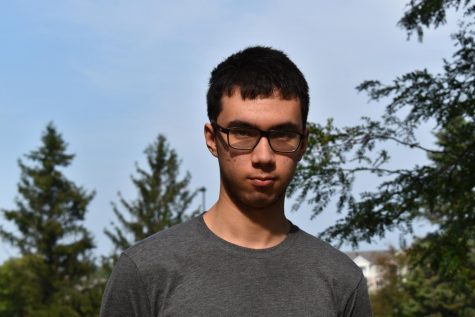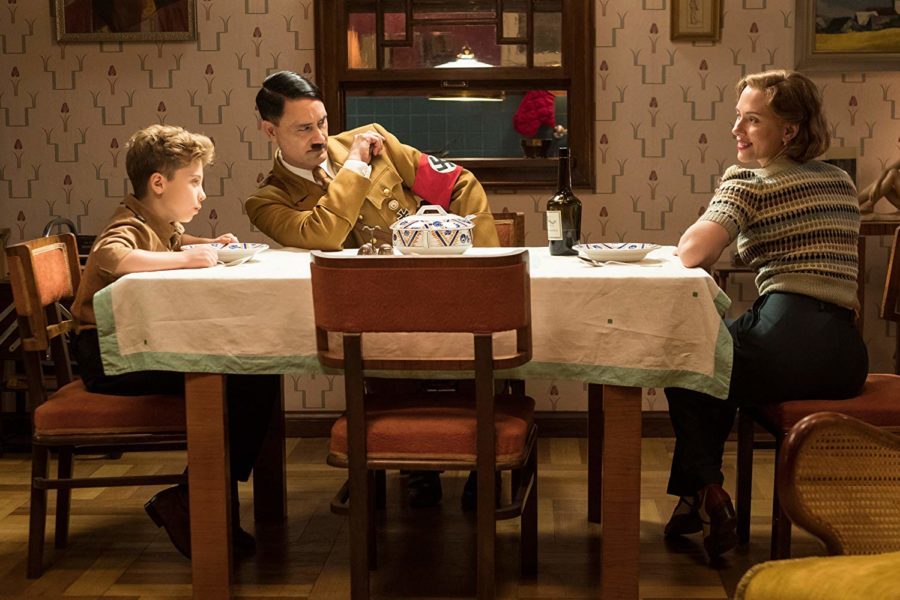“Jojo Rabbit” is a powerhouse of comedy and emotion
Taika Waititi’s holocaust drama-comedy is the perfect anti-hate satire.
Taika Waititi plays an imaginary Hitler in this hard-hitting Holocaust satire.
Taika Waititi has proven himself again and again to be one of Hollywood’s greatest tour de force directors of delightfully bizarre arthouse films that tread the line between drama and full-on comedy. Viewers that have followed him closely through his slow rise may attribute his name to the mockumentary “What We Do in the Shadows” or the dramedy “Hunt for the Wilderpeople,” but the majority only known him from him reviving the dying “Thor” franchise for Marvel. Whether you’re in either of those boats or don’t even know his name at all, his latest, “Jojo Rabbit” is a must-see for all.
The story follows a young German boy named Jojo (Roman Griffin Davis) who aspires to follow the footsteps of his hero Adolf Hitler, aided by a race-bent imaginary version of the führer (Waititi.) When he discovers that his mother (Scarlett Johansson) has been hiding a Jewish girl (Thomasin McKenzie) in their attic, Jojo learns the truth behind the war that goes on in the background.
The brilliance of “Jojo Rabbit” lies in its simplicity. At its core, the film is about going to war with the hate that plagues society. Instead of making the movie one of the eloquent and thought-churning pieces that win all the awards, Waititi makes the conscious decision to ground it in that one theme and let it flow through the happenstances of a ten-year-old boy in the midst of Nazi Germany. Rather than wroughting the film in complex drama and heartbreak, Waititi interweaves a comedic tone that goes hand in hand with the drama. “Jojo Rabbit” won’t cause you to tear up and come out of the theater with your perspective changed like “Schindler’s List” or many of the other Holocaust-centered works, yet its message is just as strong in a different manner.
That theme of fighting back hatred is apparent in the relationship between Jojo and Elsa, the Jewish girl. Jojo, being the child Nazi fanatic that he is, fails to see the meaning of his mother hiding Elsa. His acquaintance with Elsa starts off wary, but slowly develops into Jojo seeing the truth behind the party he is serving. It’s that discovery that all the lies and stereotypes that he has been fed about them is false, and that Jews are as human as everyone else, that really moves the film.
The mother-son dynamic is another powerful set point of the movie. They have a lively relationship with each other that carries all their scenes together. In addition, Jojo’s mother represents the side that sees the ugliness that society can pertain and does her best to fight it. Jojo, not understanding why she acts the way she does, fails to see the effect of her actions. In the middle of the movie, though, a distressing moment splits them apart and Jojo realizes what she was fighting for.
“Jojo Rabbit” is also about the dire consequences of war, not from the perspective of a soldier or a general, but from the viewpoint of an innocent boy. These horrors and carnage that come out of the war are deeply rooted throughout the film even if we don’t directly see any of the fighting until the final minutes of the movie.
I mentioned how “Jojo Rabbit” has its dark comedy aspects, and that it does. For some that haven’t seen the movie, they may be skeptical of why it needs any comedy and that this use of satire takes away any seriousness of the situation. That is not true. Waititi has the perfect eye for including laugh-out-loud comedic moments but also developing raw drama and solemnity, these tones sometimes overlapping in the very same scene. Yet, there’s another layer to the majority of his humor that express ideals volumes better than some movies that obviously try hard to push them out.
The movie is also beautiful in its cinematography. The color palette is vibrant, never stressing one single color over another. It paints a notable contrast with the movies that are grey-scaled and have a grimy feel to them. Furthermore, the camera work is spectacular, appropriately giving a mix of close-up shots to the faces of characters in order to glean their emotions and zoomed out perspective shots of the radiant scenery.
The stars of “Jojo Rabbit” are all perfectly casted. Sam Rockwell is pitch perfect as the leader of the Youth Nazis and gives off every bit of humor and hilariocity as the role requires. Though he only has one main scene in the movie (out of two total scenes), Stephen Merchant is absolutely hilarious as a stereotypically ignorant member of the German Gestapo. Waititi, similarly, will have you in hysterics with his idiotic portrayal of imaginary Hitler. Davis and McKenzie both show an aptitude for acting out emotions through facial expressions while counteracting drama with lively energy.
Is “Jojo Rabbit” a perfect movie? Definitely not. Sometimes it can be shaky in its storytelling and the script a bit too self-aware, and it’s a surefire fact that many people will interpret it in ways it was not intending. A few scenes felt like they needed more emotion than they had and a bit toned down on the comedy.
Despite small quibbles, though, “Jojo Rabbit” needs to be seen. It is delightfully original, and a powerhouse of both humor and emphasizing darker, more dramatic motifs. With today’s political climate, this satire is the perfect breath of fresh air that fights against the hate that has prospered throughout time.
Heads up, Oscars: it looks like you have another Best Picture contender on the line.
Grade: A
Your donation will support the student journalists of West High School. Your contribution will allow us to purchase Scholarship Yearbooks, newsroom equipment and cover our annual website hosting costs.

Edward Keen is a senior and this is his second year on staff, where he is Arts Editor. In his free time, he enjoys reading.




